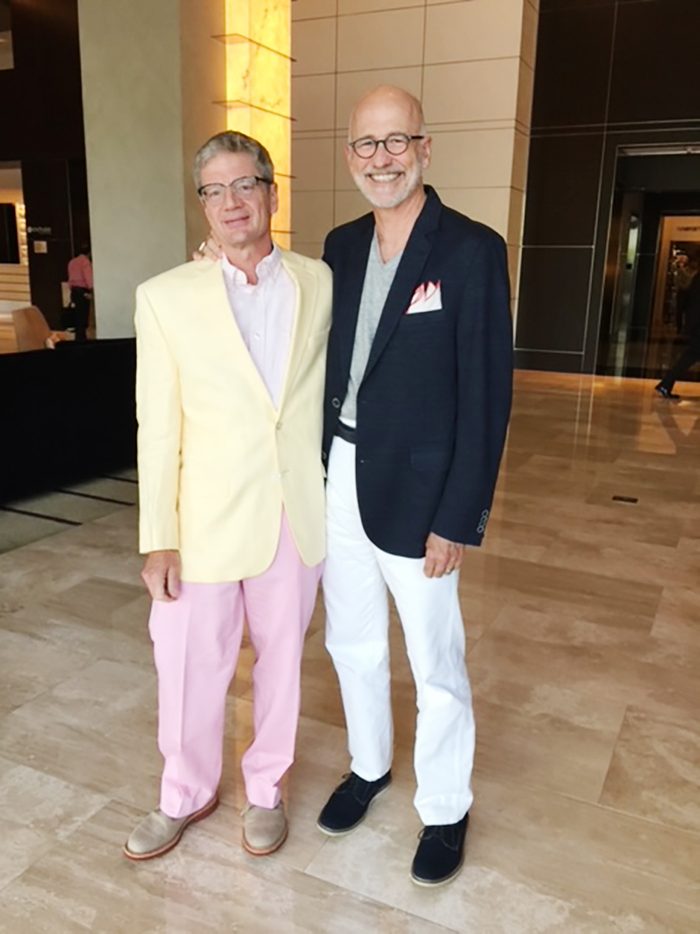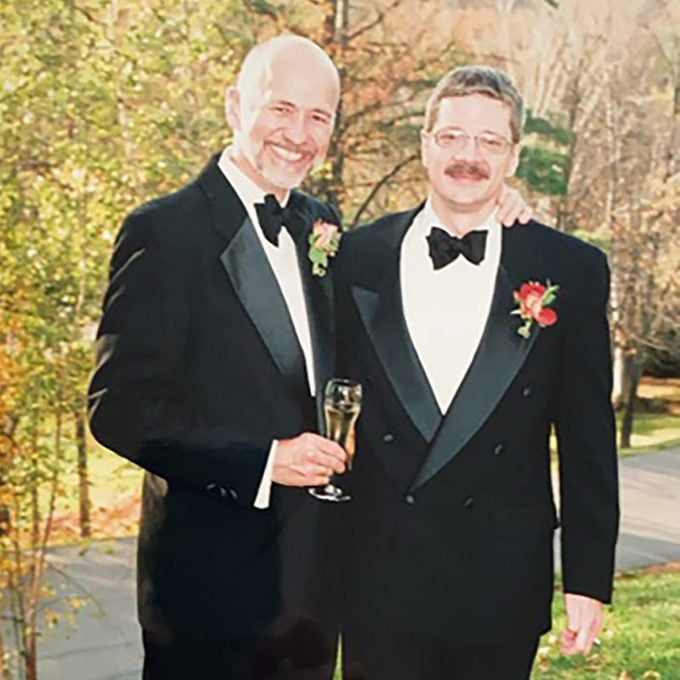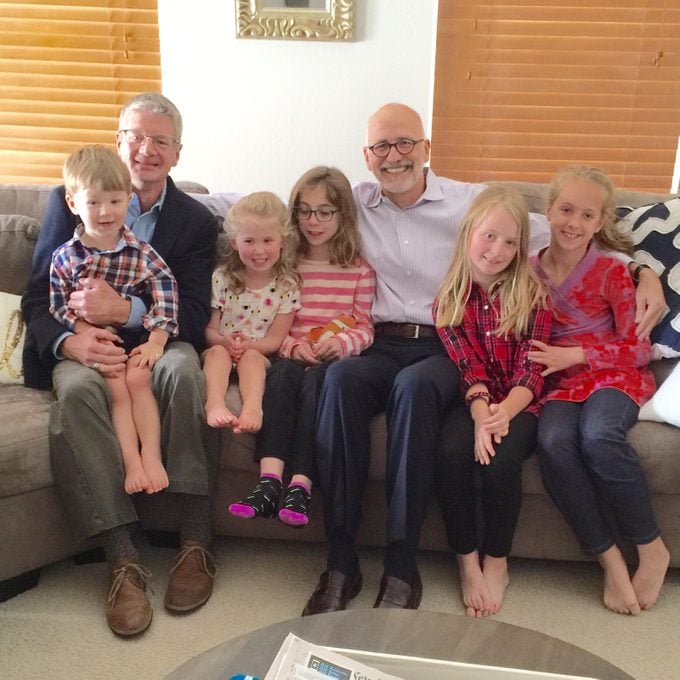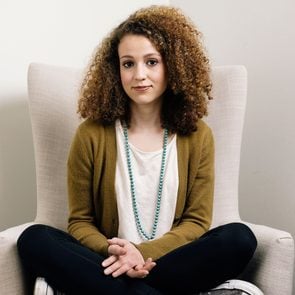I Came Out After 20 Years of Marriage and Met the Love of My Life
Updated: Feb. 07, 2023

Larry Best thought he had the perfect love and the perfect marriage, but until he found his husband and soul mate, he didn't know how perfect love and marriage could actually be.
In 1966, when Larry Best first laid eyes on the woman he would marry, he had no idea he was looking at both his future and his past. He and his wife were married for 20 years and raising three children together when, in 1992, Best came out as gay. It was a curveball that led him straight to the love of his life. He met his future husband, Kory, shortly after, and they have been together for 29 going on 30 years. (Their three-decade milestone will arrive next February.)
They haven’t had a traditional love story. It’s the kind of unconventional one you see in LGBTQ movies and read about in LGBTQ books—and the kind that inspires immortal LGBTQ quotes. It also has a fairy-tale ending: Boy meets boy, and they lived happily ever after. Now 71 and based in Covington, Louisiana, and Pensacola, Florida, with Kory, the retired trial lawyer is looking back while looking forward, reliving his life and love story in the memoir How Could You Not Know You’re Gay?, which he is currently publishing in serialized form on Medium’s Prism & Pen. During Pride Month or on Coming Out Day, when the LGBTQ community waves the rainbow flag even more emphatically than usual, or just on a regular day when you need some perspective, Best can serve as a source of inspiration, showing it’s never too late to be who you might have been. Here’s his story, in his own words.
I married my high school sweetheart
I met her in my senior year. She was a junior. I only dated girls at the time; it never occurred to me that there were any other options. In those days, you found a girl and got married. She had transferred to my high school in New Orleans from Wisconsin, so I think she caught my eye because her accent was a little different. She dressed a little differently, too, and she was very smart. I remember her going to the blackboard in French class, and she always had the right answer. We started seeing one another, and we really clicked.
We stayed together through the summer after I graduated from high school, but her parents moved back to Wisconsin. We kept up with one another while I was in college—you know, mail and phone calls—though I was dating other girls, and we eventually renewed our relationship. Of all the girls I dated in high school and college, she was the person I felt most comfortable with and felt like was the best fit for me.
By the time we got married in 1971, I’d been living with a huge secret for a decade
I knew I was attracted to men. I knew that from the time I was 12 because in gym class, all I was doing was staring at the boys and berating myself for doing so. Stop that! Stop that! Stop that! By the time I got married, I knew I was attracted to men, but I thought I was attracted to men also. I dated girls and performed perfectly well sexually with women. I had a good time. I’d never had sex with a man, and I’d never even touched a guy or been touched by a guy. That was a foreign concept to me.
At that time in America, queers were criminals, statutorily, and socially, no matter what the law was, we were just the worst of the worst. So it was either get married and have a normal life and a successful career and respectability or be a low-life criminal. It was as simple as that. There was no analysis required.
I had a lot of societally imposed internal homophobia. Relationships with men struck me as emotionless, lustful encounters. So if I had that on one side versus respectability and a lovely wife, a great relationship, a great companion, and an acceptable sex life, it was no choice at all. I’ve recently read a term that has come into usage called “compulsory heterosexuality,” and I will tell you, in New Orleans in the ’50s and ’60s, when I was a child, that’s how life was, so I didn’t see I had a choice.
I was faithful to my wife…until I wasn’t
We were married for 20 years and I thought I had the perfect family. I thought I had the perfect marriage. I looked at men, but I had compartmentalized that and put it away. I was not going to let it affect our family life or our future. I was faithful for 20 years, but it began to gnaw at me.
Toward the end of the ’80s, when I was out of town traveling on business, I started going to gay bars. Nothing happened for four or five years, and then one night in Alexandria, Louisiana, at the only little gay bar down a dark side street with no sign and no windows, this guy walks in and strikes up a conversation. He was a prison guard, married with two children. We went back to my hotel room, and that was the first time I ever had sex with a man. He was so nice and so sweet and gentle and caring.
Afterward, I said to myself, “What do I do now? I guess I’ll just have to continue to compartmentalize this and see men on the side—every now and again when I’m out of town. It’s not optimal. I don’t like betraying my wife, but I don’t have a choice.” There was this sexual imperative, if you will, that was irresistible and uncomfortable.
Then I went to Boston and fell in love
About 30 days later, I hired a rent boy (an escort) in Boston. This young 26-year-old man shows up, and he’s an architecture student with a girlfriend. He was gone after an hour, but I thought about him all night. As soon as I finished my business trip and got back to New Orleans, I started looking at my upcoming business trips and making arrangements to fly him in from anywhere to meet me in the cities I was traveling to.
In the course of this, it hit me. I said to myself, “Oh, my God, you’re in love. That’s what this is.” I hadn’t believed it was possible to love a man or even imagined having an emotional attachment to a man, and here I was, falling for a rent boy. I felt pathetic like I had royally screwed up my life. I broke down in tears at my desk in my office when I had this realization.
I thought about it for a couple of days. I stopped chasing the rent boy since I knew that wasn’t going anywhere, but it was a revelation and an important one. It put me on a path to honesty and integrity, wholeness, and a wonderful, full life.
About a month later, I told my wife that I was sorry, I was gay, and I was leaving. A week later, we told the children. She wanted to wait because our eldest daughter had a high school dance, and she didn’t want to spoil that for her. So we waited until the next day, and then I told the kids. The next week, I moved out. And shortly after that, I met the man who I’ve been with ever since.
Coming out to my children was harder than coming out to my wife
My eldest daughter was 15. My son, 13, and my other son, nine. My wife was 41. I thought the hardest day of my life was telling my wife…until I had to tell my kids. That was absolutely the worst day of my life. For me, this had been building for a lifetime, but they were blindsided in an instant. I can’t even imagine what it must have been like for them. I hoped they would understand, and I hoped they would forgive me, and I assured them I was not going anywhere—that I was going to be in their lives.
My wife and I had already agreed we were going to co-parent. We would live in separate places, but we were still going to function as a family for the benefit of the children. It was very gracious and loving of her, and I’m sure it was not an easy thing for her to do. But she always put the children first, so this fell into that category for her. She was very generous to me. Of course, she was also very hurt, and there were lots of tears. That went on for months, off and on, and with me, too, because I was grieving this 20-year idyllic family life that I had really enjoyed and loved. It was hard on all of us.
I met my husband, Kory, shortly afterward
In those days, we didn’t have the Internet yet, and I didn’t know any gay people, so I was answering personal ads in print publications. I found an ad in the gay publication Impact that said, “Five-foot-ten, brown eyes, 150 pounds. Looking for friendship, good times, maybe more.” I was answering lots of ads. I wanted to play catch-up desperately. And so he answered me, but we didn’t hook up like all the other guys I met through ads. He wanted to get to know me first, so we exchanged cards and letters for four months. He’d send me a picture of himself, and I’d send him a picture of me, and we started talking on the phone, sometimes for two hours at a time.
In February of ’92, Kory and I finally met in person during Mardi Gras. We dated for a couple of weeks before I invited him to spend the night. He said, “OK, but on one condition: no sex.” We just curled up around one another, and he went to sleep. I didn’t sleep all night. I was just so excited to be together. And during that night, I knew. I know it sounds stupid and like a fairy tale, but I said, “Oh my gosh, I think he’s the one.” It went from there, and we’ve been a couple ever since. It’ll be 30 years this February.
We had two weddings
Shortly after Vermont started doing civil unions, we went there and had a traditional wedding ceremony. That was in 2001. A good friend of mine, a federal judge from New Orleans—a married, straight woman who was also a gay rights activist—officiated along with a Vermont justice of the peace. My family was there. My ex-wife was invited; she chose not to come. Kory’s siblings came, and his nieces and nephews came, but his parents didn’t come because they’re Catholics from a very conservative parish in Louisiana. They said, “It’s just not right.” And so they did not come. But we had a lot of family and friends there.
Then when New York passed marriage equality in 2013, we flew to New York and got married before a justice of the peace. So we celebrate three anniversaries: the first night we spent together, with no sex; our Vermont civil union; and then our marriage in New York.
I no longer talk to my ex-wife
For 20 years, we functioned pretty much as a family. We did all the holidays and birthday celebrations together. Kory just became part of my family, and I became part of his. It happened because of the goodwill and love of a lot of people, including my ex-wife. I think it was very hard for her, but I think she knew it was the right thing to do. She wanted to do the right thing, and we really had a wonderful relationship.
I have a letter she wrote in 2010 to me and Kory saying how much she valued us and our relationship and how much she knew she could count on us. But then, after 20 years, on the 20-year anniversary of my leaving her, she more or less stopped talking to me. She tells our sons that she doesn’t want to be in the same room with us. I think she made an effort for a long time, and then one day, it just soured on her. And so now we don’t have a relationship anymore. It has broken my heart because I spent 20 years with her. She’s the mother of our children, and I love her very much, and I wish she was still in my life, but I respect that that doesn’t work for her anymore.
Kory has a good relationship with my kids
Kory has always been wonderful with my kids. I remember once when I had depositions in Buffalo, New York, in the dead of winter, Kory took my youngest, who was 11 at the time, for a ride in the rental car and did doughnuts in an empty parking lot in the snow. They had a wonderful time.
And he’s a really good grandpa, too. Yesterday, Kory spent the day babysitting the youngest grandchild for about six hours, and he’s doing that, like, three days a week because my son and my daughter-in-law both work. He’s a much better grandpa than I am because he likes children better than I do. All of them call him Nonna. I think it’s meant a lot to him to have those relationships because he has no children of his own.
A few regrets
Kory’s sister was willing to carry a child for us in the mid-’90s. I said, “Jesus, Kory, I don’t know if I could do this. I feel like I’ve done my time. I’ve got three kids. I have all this private school tuition and college tuition coming up. To add a fourth, I just don’t know if I could do it.” He didn’t press it, and now I regret that. I think he would have made a wonderful dad.
I have struggled for a long time about whether I regret not coming out sooner and if I regret ever getting married in the first place. Those are really tough questions because I wouldn’t have my wonderful children and grandchildren. I wouldn’t have had 20 really wonderful, happy years with my wife either. Also, if I had come out in 1971 at the end of college, my life might have been very different. I might have died of AIDS because I would have been out and active before AIDS even became a factor. I certainly wouldn’t have had my career, couldn’t have gotten a job as a lawyer, probably couldn’t have gotten into law school. I would have had to be closeted.
I think, in the end, things worked out maybe the only way they could—and the way they should have. I have had so many blessings in my life that I shouldn’t dwell on regrets. I’ve tried to do the right thing in my life, and I’ve tried to take care of the people in my life. I still try to do that, even though I’m not nearly as thoughtful and good and sweet a person as Kory is.
Some advice to married men struggling with whether to come out
You’re worthwhile. You’re valuable. You have to take care of yourself, too. You can’t really take care of other people and be there as a whole, integrated person for them until you love and respect yourself first. That’s easy advice to give, but it takes a lot of people, including me, a long time to get there. Love yourself, protect yourself, take care of yourself, because society has not done you any favors.
Go out and meet people and create your new family, because there’s a wonderful life out there—if you go make it happen. And it will happen, as dark as it seems now. If your children love you now, they’re going to love you after. It’s going to be a difficult period of adjustment for them because you’ve been dealing with this for years and they found out in 10 minutes. So you have to be patient with them, and you have to give them space and give them time to come around, and I think most of them will.
For more inspiration, read about the LGBTQ activists who changed American history, and then learn how to be an LGBTQ ally.




